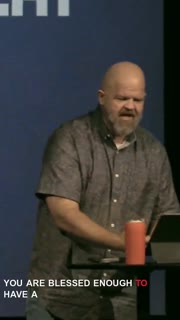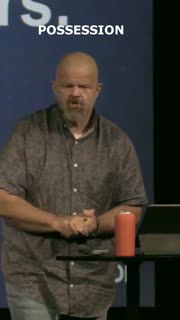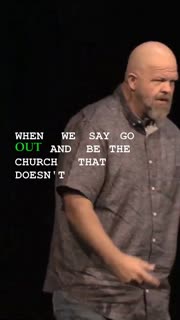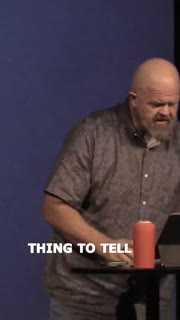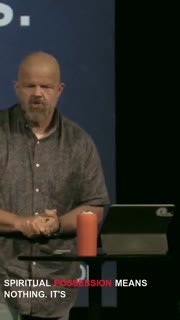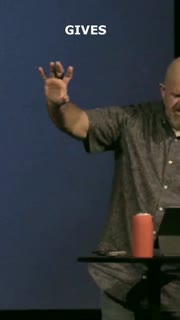Applying God's Teachings: The Power of Communion
Summary
### Summary
Today's sermon focused on the importance of communion and the broader spiritual principle of applying God's teachings in our lives. We began by discussing the significance of communion, emphasizing that it is not just a ritual to be performed in church but a meaningful act that can be done anywhere, even alone. Communion is a way to remember and honor Jesus' sacrifice, and it brings numerous blessings, including physical healing and spiritual freedom.
We then transitioned to the main message, which centered on the phrase "Take and Eat" from Matthew 26:26. This phrase highlights a two-step process: taking (receiving) and eating (applying). The conjunction "and" is crucial because it connects two equally important actions. Simply possessing spiritual knowledge or blessings is not enough; we must also apply them to experience their full benefits.
We explored various examples to illustrate this point. For instance, owning a treadmill doesn't improve your health unless you use it, and having a book doesn't benefit you unless you read it. Similarly, spiritual possession without application is meaningless. Jesus' teachings in Matthew 7 and James 1 emphasize that hearing God's word is not enough; we must also do what it says.
The sermon concluded with a call to self-examination and application. We were encouraged to allow the Holy Spirit to search our hearts and reveal areas where we need to apply God's teachings more fully. This act of surrender and application is essential for spiritual growth and for experiencing the blessings that God has in store for us.
### Key Takeaways
1. Communion Beyond Ritual: Communion is not confined to the church or specific leaders. Jesus instituted it in a house, emphasizing its accessibility to all believers. The act of communion is a profound way to remember Christ's sacrifice and can bring physical and spiritual healing. It’s a reminder that our faith is not about rituals but about a personal relationship with Jesus. [47:24]
2. The Importance of "And": The phrase "Take and Eat" from Matthew 26:26 underscores the necessity of both receiving and applying God's blessings and teachings. Possession without application is incomplete. Just as owning a treadmill doesn't improve health unless used, spiritual knowledge must be applied to be effective. [59:14]
3. Spiritual Application Over Possession: Spiritual possession means nothing without application. Jesus' teachings in Matthew 7 and James 1 highlight that merely hearing the word is insufficient; we must also act on it. This principle applies to all areas of life, including salvation, healing, and daily living. [01:03:53]
4. Self-Examination and Surrender: Before taking communion, we should examine ourselves and allow the Holy Spirit to reveal areas needing surrender. This self-examination ensures that we partake in communion worthily and align our lives with God's will. It’s a time to confess sins and recommit to living according to His teachings. [52:26]
5. Practical Application of Faith: Knowledge of God's word must translate into action. Whether it's losing weight, ending negative relationships, or seeking healing, the application of God's teachings brings transformation. Spiritual growth and blessings come from applying what we know, not just possessing the knowledge. [01:16:29]
### YouTube Chapters
[0:00] - Welcome
[42:19] - Building Relationships
[43:52] - Men and Women of Valor
[45:03] - Being the Church
[46:17] - Introduction to Communion Series
[47:24] - Communion at Home
[48:47] - Tradition vs. Biblical Mandate
[49:54] - Partaking Worthily
[51:15] - Heart Check Before Communion
[52:26] - Self-Examination
[53:45] - Taking Communion Alone
[55:22] - Open Q&A
[56:33] - Growing in Faith
[57:53] - Take and Eat
[59:14] - The Importance of "And"
[01:03:53] - Spiritual Application
[01:16:29] - Practical Application of Faith
[01:20:17] - Communion Instructions
[01:28:28] - Prayer and Healing
[01:29:48] - Closing Remarks
Study Guide
### Bible Study Discussion Guide
#### Bible Reading
1. Matthew 26:26-28 (NIV)
> "While they were eating, Jesus took bread, and when he had given thanks, he broke it and gave it to his disciples, saying, 'Take and eat; this is my body.' Then he took a cup, and when he had given thanks, he gave it to them, saying, 'Drink from it, all of you. This is my blood of the covenant, which is poured out for many for the forgiveness of sins.'"
2. James 1:22-25 (NIV)
> "Do not merely listen to the word, and so deceive yourselves. Do what it says. Anyone who listens to the word but does not do what it says is like someone who looks at his face in a mirror and, after looking at himself, goes away and immediately forgets what he looks like. But whoever looks intently into the perfect law that gives freedom, and continues in it—not forgetting what they have heard, but doing it—they will be blessed in what they do."
3. Matthew 7:24-27 (NIV)
> "Therefore everyone who hears these words of mine and puts them into practice is like a wise man who built his house on the rock. The rain came down, the streams rose, and the winds blew and beat against that house; yet it did not fall, because it had its foundation on the rock. But everyone who hears these words of mine and does not put them into practice is like a foolish man who built his house on sand. The rain came down, the streams rose, and the winds blew and beat against that house, and it fell with a great crash."
#### Observation Questions
1. What are the two actions Jesus commands in Matthew 26:26, and why are both actions significant? [59:14]
2. According to James 1:22-25, what is the consequence of merely listening to the word without doing what it says?
3. In Matthew 7:24-27, what analogy does Jesus use to describe the difference between those who hear His words and put them into practice versus those who do not?
#### Interpretation Questions
1. Why is the conjunction "and" in the phrase "Take and Eat" from Matthew 26:26 so important in understanding the full meaning of Jesus' command? [59:14]
2. How does the analogy of building a house on rock versus sand in Matthew 7:24-27 help us understand the importance of applying Jesus' teachings in our lives?
3. What does James mean when he says that merely listening to the word and not doing it is like looking in a mirror and forgetting what you look like? How does this relate to the sermon’s emphasis on application over possession? [01:03:53]
#### Application Questions
1. Communion is described as a meaningful act that can be done anywhere, even alone. Have you ever taken communion outside of a church setting? How did it impact your personal relationship with Jesus? [47:24]
2. Reflect on a time when you possessed spiritual knowledge but did not apply it. What were the consequences, and how might things have been different if you had applied that knowledge? [01:03:53]
3. The sermon emphasized the importance of self-examination before taking communion. What specific areas of your life do you feel the Holy Spirit is prompting you to surrender or change? [52:26]
4. Think about a practical area in your life where you need to apply God's teachings more fully (e.g., health, relationships, work). What steps can you take this week to start applying what you know? [01:16:29]
5. The sermon mentioned that spiritual growth and blessings come from applying what we know. Identify one specific teaching of Jesus that you have struggled to apply. What is one action you can take this week to begin applying it? [01:03:53]
6. How can you make your daily routine more reflective of the principle "Take and Eat" by not just receiving God's word but also actively applying it? [59:14]
7. The pastor shared personal stories of healing and transformation through the application of faith. Do you have a testimony of how applying God's word has brought change in your life? If so, share it with the group. [01:12:12]
Devotional
### Day 1: Communion as a Personal Act of Worship
Communion is not confined to the church or specific leaders. Jesus instituted it in a house, emphasizing its accessibility to all believers. The act of communion is a profound way to remember Christ's sacrifice and can bring physical and spiritual healing. It’s a reminder that our faith is not about rituals but about a personal relationship with Jesus. [47:24]
Communion is often seen as a ritual performed within the walls of a church, led by ordained leaders. However, the essence of communion goes beyond these boundaries. Jesus instituted communion in a house, making it clear that this sacred act is accessible to all believers, regardless of location or leadership. Communion is a profound way to remember and honor Christ's sacrifice, and it carries the potential to bring both physical and spiritual healing. It serves as a reminder that our faith is not about adhering to rituals but about nurturing a personal relationship with Jesus.
When we partake in communion, we are invited to reflect on the depth of Christ's love and the magnitude of His sacrifice. This act of remembrance is not limited to a specific setting; it can be done anywhere, even in the solitude of our homes. By embracing this perspective, we can experience the blessings of communion more fully, recognizing that it is a personal act of worship that connects us directly to Jesus.
1 Corinthians 11:23-26 (ESV): "For I received from the Lord what I also delivered to you, that the Lord Jesus on the night when he was betrayed took bread, and when he had given thanks, he broke it, and said, 'This is my body, which is for you. Do this in remembrance of me.' In the same way also he took the cup, after supper, saying, 'This cup is the new covenant in my blood. Do this, as often as you drink it, in remembrance of me.' For as often as you eat this bread and drink the cup, you proclaim the Lord's death until he comes."
Reflection: How can you incorporate the practice of communion into your personal worship time this week, and what steps will you take to make it a meaningful act of remembrance and connection with Jesus?
### Day 2: The Power of "And"
The phrase "Take and Eat" from Matthew 26:26 underscores the necessity of both receiving and applying God's blessings and teachings. Possession without application is incomplete. Just as owning a treadmill doesn't improve health unless used, spiritual knowledge must be applied to be effective. [59:14]
The phrase "Take and Eat" from Matthew 26:26 highlights a crucial aspect of our spiritual journey: the necessity of both receiving and applying God's blessings and teachings. The conjunction "and" signifies that these two actions are inseparable and equally important. Possessing spiritual knowledge or blessings without applying them is incomplete and ineffective. Just as owning a treadmill doesn't improve one's health unless it is used, spiritual knowledge must be put into practice to yield its full benefits.
This principle is evident in various aspects of life. For instance, having a book doesn't benefit you unless you read it, and owning a tool doesn't help unless you use it. Similarly, in our spiritual lives, merely hearing God's word is insufficient; we must also act on it. By embracing this two-step process of receiving and applying, we can experience the transformative power of God's teachings in our lives.
James 1:22-25 (ESV): "But be doers of the word, and not hearers only, deceiving yourselves. For if anyone is a hearer of the word and not a doer, he is like a man who looks intently at his natural face in a mirror. For he looks at himself and goes away and at once forgets what he was like. But the one who looks into the perfect law, the law of liberty, and perseveres, being no hearer who forgets but a doer who acts, he will be blessed in his doing."
Reflection: Identify one area of your life where you have been receiving God's teachings but have not yet applied them. What practical steps can you take this week to begin applying these teachings and experience their full benefits?
### Day 3: Spiritual Application Over Possession
Spiritual possession means nothing without application. Jesus' teachings in Matthew 7 and James 1 highlight that merely hearing the word is insufficient; we must also act on it. This principle applies to all areas of life, including salvation, healing, and daily living. [01:03:53]
Spiritual possession, such as knowledge of God's word or awareness of His blessings, holds little value without application. Jesus' teachings in Matthew 7 and James 1 emphasize that merely hearing the word is insufficient; we must also act on it. This principle is not limited to specific aspects of our faith but applies to all areas of life, including salvation, healing, and daily living. The true power of God's word is unlocked when we move beyond mere possession and actively apply it in our lives.
For example, knowing about the importance of forgiveness is one thing, but actually forgiving someone who has wronged us is where the real transformation occurs. Similarly, understanding the concept of faith is different from stepping out in faith in challenging situations. By applying God's teachings, we align our actions with His will and open ourselves to the blessings and growth that come from living out our faith.
Matthew 7:24-27 (ESV): "Everyone then who hears these words of mine and does them will be like a wise man who built his house on the rock. And the rain fell, and the floods came, and the winds blew and beat on that house, but it did not fall, because it had been founded on the rock. And everyone who hears these words of mine and does not do them will be like a foolish man who built his house on the sand. And the rain fell, and the floods came, and the winds blew and beat against that house, and it fell, and great was the fall of it."
Reflection: Reflect on a specific teaching of Jesus that you have heard but not yet acted upon. What steps can you take this week to put this teaching into practice and build a solid foundation for your spiritual life?
### Day 4: Self-Examination and Surrender
Before taking communion, we should examine ourselves and allow the Holy Spirit to reveal areas needing surrender. This self-examination ensures that we partake in communion worthily and align our lives with God's will. It’s a time to confess sins and recommit to living according to His teachings. [52:26]
Self-examination and surrender are essential practices for believers, especially before partaking in communion. This process involves allowing the Holy Spirit to search our hearts and reveal areas that need surrender and alignment with God's will. By examining ourselves, we ensure that we partake in communion worthily, with a heart that is open to God's transformative work. This time of reflection is an opportunity to confess sins, seek forgiveness, and recommit to living according to His teachings.
Engaging in self-examination helps us identify areas where we may have strayed from God's path or where we need to grow spiritually. It is a humbling experience that brings us closer to God and prepares us to receive the blessings of communion with a pure heart. By surrendering our shortcomings and aligning our lives with His will, we open ourselves to the fullness of His grace and love.
1 Corinthians 11:28-29 (ESV): "Let a person examine himself, then, and so eat of the bread and drink of the cup. For anyone who eats and drinks without discerning the body eats and drinks judgment on himself."
Reflection: Take a moment to ask the Holy Spirit to reveal any areas of your life that need surrender and alignment with God's will. How can you confess these areas and recommit to living according to His teachings before your next communion?
### Day 5: Practical Application of Faith
Knowledge of God's word must translate into action. Whether it's losing weight, ending negative relationships, or seeking healing, the application of God's teachings brings transformation. Spiritual growth and blessings come from applying what we know, not just possessing the knowledge. [01:16:29]
The practical application of faith is a crucial aspect of spiritual growth. Knowledge of God's word must translate into action for it to bring about transformation in our lives. Whether it's losing weight, ending negative relationships, or seeking healing, the application of God's teachings is what leads to real change. Spiritual growth and blessings come from applying what we know, not just possessing the knowledge.
For instance, understanding the importance of healthy living is different from making daily choices that promote physical well-being. Similarly, recognizing the need to end toxic relationships requires the courage to take action and set boundaries. By applying God's teachings in practical ways, we allow His word to shape our lives and lead us toward the abundant life He promises.
James 2:17-18 (ESV): "So also faith by itself, if it does not have works, is dead. But someone will say, 'You have faith and I have works.' Show me your faith apart from your works, and I will show you my faith by my works."
Reflection: Identify one specific area of your life where you need to apply God's teachings more fully. What practical steps can you take this week to put your faith into action and experience the transformation that comes from living out God's word?
Quotes
### Quotes for Outreach
1. "Everywhere you go, you should be loving people just as Christ loves people. You should be loving each other. You should be representing him in how you live and how you act and how you talk and whatever you do, you should do it to the best of your ability is under the Lord and everything you do right." [45:03] (13 seconds)
2. "If you are blessed enough to have a significant other in your life, listen, you can have hugs or you can have hugs and kisses. Come on. Some of y'all may have forgot what it's like to get that first kiss. Because I hope no one will disagree with me that hugs and kisses are better than hugs. Yeah. The and's important. It's a good thing. Ands can be a big deal." [01:01:00] (29 seconds)
3. "Spiritual possession means nothing. It's spiritual application that matters. Turn over to Matthew chapter seven. Jesus' teaching here says this. Anyone, and this is starting in verse 24, anyone who listens to my teaching and follows it is wise. Like a person who builds a house, a house is a house. He builds a house on a solid rock." [01:04:44] (20 seconds)
4. "When it feels like you're being attacked you need to remember that the Bible says that no weapon formed against me shall prosper and all those who rise up against me will be condemned that the Bible says greater is he who is within me than he is in this world if you feel like it's a spiritual attack take heart in the fact that that God's defeated the enemy and stand on that." [01:13:26] (19 seconds)
5. "If you confess with your mouth that Jesus is Lord and believe in your heart that God's raised him from the dead we will be saved amen that's the truth of salvation but that won't help you unless you accept it you apply it unless you indeed do confess that Jesus is Lord and believe in your heart that God's raised him from the dead and yes that will cause some changes in your life." [01:09:34] (30 seconds)
### Quotes for Members
1. "When we say go out and be the church that doesn't mean you have to do something super spiritual okay it doesn't mean you need to go lead a bible study at walmart in the sports sporting goods department i mean go ahead if god tells you to do that do it but what it means is everywhere you go you should be loving people just as christ loves people you should be loving each other." [45:03] (20 seconds)
2. "The important thing to tell you is that if you're a Christian and you're a Christian and you're a and to study of the lord's supper is this a every believer should partake it's a way that we can reverence and remember what he's done for us and there's so many applications be there are abundant blessings and reasons why we should partake." [48:47] (18 seconds)
3. "Spiritual possession means nothing. It's spiritual application that matters. Turn over to Matthew chapter seven. Jesus' teaching here says this. Anyone, and this is starting in verse 24, anyone who listens to my teaching and follows it is wise. Like a person who builds a house, a house is a house. He builds a house on a solid rock." [01:04:44] (20 seconds)
4. "Spiritual application gives glory to God this is my favorite one because when we apply his teaching to our lives and when we do indeed overcome and we do indeed come out the other side of the trial victorious God is glorified he is glorified because we trusted him it quite honestly doesn't matter how much you have learned it doesn't matter how much you know what matters is how much you have applied." [01:14:44] (31 seconds)
5. "If you confess with your mouth that Jesus is Lord and believe in your heart that God's raised him from the dead we will be saved amen that's the truth of salvation but that won't help you unless you accept it you apply it unless you indeed do confess that Jesus is Lord and believe in your heart that God's raised him from the dead and yes that will cause some changes in your life." [01:09:34] (30 seconds)

